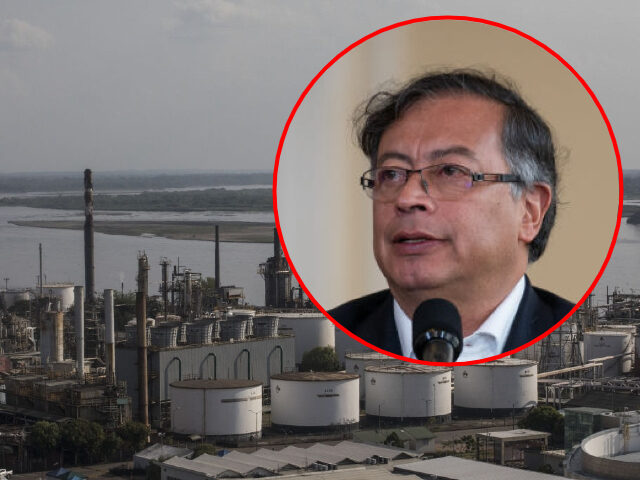Colombia’s brand-new, far-left government announced this weekend that it would halt all contracts for natural gas exploration and production, a move that will put an end to Colombia’s self-sufficiency in natural gas.
The administration of Gustavo Petro, a former member of the Marxist M19 guerrilla inaugurated as president last week, confirmed he would sign a decree to end Colombia’s energy independence with natural gas.
Environment Minister Susana Muhamad introduced a bill on August 10 to ban fracking in Colombia. On Friday, Petro’s Energy Minister Irene Vélez announced the ban on new contracts in a radio interview given to Colombia’s Blu Radio on Friday — day six of Petro’s four-year presidency. She suggested that, should the policy result in natural gas shortages, Petro would simply buy the fossil fuel from neighboring Venezuela, a repressive socialist state that regularly threatens to invade or declare war on Colombia.
Vélez stated that she hopes that the existing 180 active gas exploration contracts will be sufficient to cover the nation’s natural gas needs as the Petro government moves the country towards green alternatives — but in the event that Colombia cannot maintain its self-sufficiency, Vélez stated in the interview that Colombia would cover the deficiency by buying natural gas from countries such as Venezuela, with whom the Petro administration has just recently begun to re-establish diplomatic relations.
“We have gas reserves for seven to eight years. If we needed to fill our energy matrix, we could make the gas transport connection with Venezuela. If it were the case that our reserves were not enough for our self-sufficiency, we need solutions, which could be to connect with other countries,” said Vélez.
Vélez framed the end of Colombia’s natural gas production within the context of “environmental justice,” a term encompassing a series of environment and climate change policies that Gustavo Petro has claimed to be one of the pillars of his presidency.
Petro was not shy in expressing animosity towards fossil fuels during his presidential campaign, which he described as “poisons” akin to cocaine. The leftist president’s goal to end Colombia’s oil industry and push the country towards a “green” energy model was one of his most fervent campaign promises, backed and praised by the international left.
Colombia, which achieved energy self-sufficiency in 1987, has enough natural gas reserves for the next eight years, according to estimates published in May by the previous administration. In July, one week before the start of Gustavo Petro’s presidency, Colombia and Brazil state-owned companies Ecopetrol and Petrobras announced the discovery of a new gas field in the deep waters of the Colombian Caribbean Sea named “Uchuva-1.”
The announcement of the end of natural gas exploration in Colombia was not without its fair share of criticism. Felipe Bayón, CEO of Ecopetrol, stated in an August 11 interview that Colombia must continue to seek out and produce gas so as not to enter into a shortage while warning that if Colombia stops producing gas and instead opts to import it, gas bills would triple for Colombian citizens.
Luz Stella Murgas, President of the Colombian Gas Association (Naturgas), expressed in a Friday interview that importing natural gas would increase gas bills fivefold for Colombian citizens while expressing her criticism at the prospect of importing Venezuelan natural gas.
“Importing gas from Venezuela should not be plan A. The action should be to develop natural gas reserves in order to guarantee the resources for much longer. We cannot sacrifice the energy independence that we have today to go back years,” Murgas commented. She also stated that Colombia currently does not have a gas pipeline nor the infrastructure that would allow the country to import natural gas.
José Ignacio López, director of Colombian financial services Corficolombiana, said via social media on Friday, “not producing gas in Colombia and buying it from Venezuela does not improve global emissions at all. It only moves production from one side of the border to another. The atmosphere does not care if it is produced here or there, but Colombia would lose its self-sufficiency.”
No producir gas en Colombia y comprárselo a Venezuela, no mejora en nada las emisiones globales. Solo traslada la producción de un lado de la frontera a otro. A la atmósfera no le importa si se produce acá o allá, pero Colombia si perdería su autosuficiencia.
— Jose Ignacio Lopez (@JoseILopez) August 12, 2022
Roy Barerras, president of the Colombian senate, also expressed his concerns via social media, supporting the energy transition while calling for planning and prudence.
“The energy transition is a vital obligation, but transitions are transitions. Gas cannot be replaced from one day to the next. Planning and prudence,” Barerras tweeted.
Invito a la Ministra de Minas a leer a @Rodrigo_Lara_ . Mi posición clara la expresé en @ANDI_Colombia: La transición energética es una obligación vital pero LAS TRANSICIONES SON TRANSICIONES! No se puede reemplazar el gas de un dia a otro. Planeación y prudencia! pic.twitter.com/HG46yujrp7
— Roy Barreras (@RoyBarreras) August 13, 2022
Christian K. Caruzo is a Venezuelan writer and documents life under socialism. You can follow him on Twitter here.

COMMENTS
Please let us know if you're having issues with commenting.